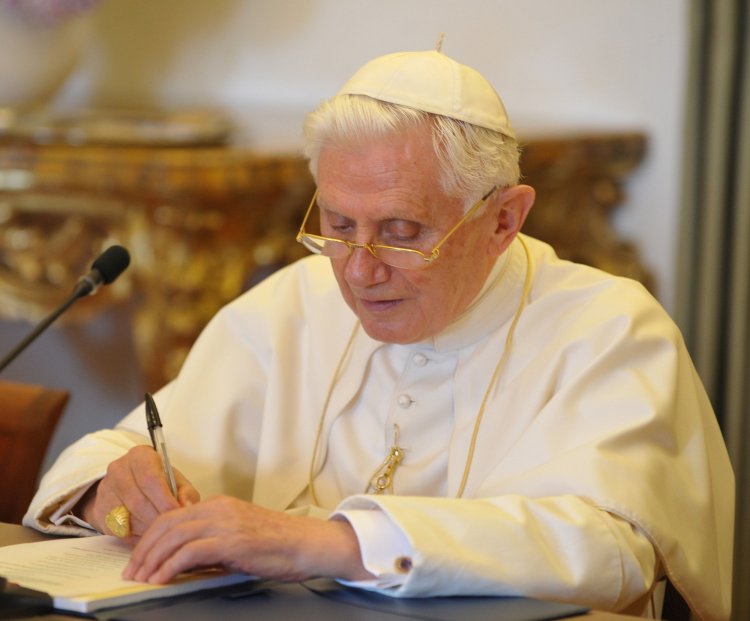What to do when there's fake news such as the 'death' of Benedict XVI: A priest responds
Father Juan Manuel Góngora of Almería, Spain, speaks with EWTN Spanish News July 12, 2022, about the need for better verification criteria for online news. / Credit: EWTN Spanish News screenshot Denver Newsroom, Jul 14, 2022 / 15:27 pm (CNA). Father Juan Manuel Góngora, a Spanish priest who has more than 53,000 followers on Twitter and who recently received an award by HazteOír (CitizenGo) for his defense of the faith on social media, explained to EWTN Spanish News on July 12 how to react to possibly fake news such as the recent claim that Pope Emeritus Benedict XVI had died.In the interview, the priest from Almería, Spain, said that when the fake news about the pope emeritus came out, “we set out to disclaim its reliability, especially considering that that account was fake and was spreading a lie.”The fake Twitter account @BischofBatzing used the name of the president of the German Bishops’ Conference, Bishop Georg Bätzing, who just minutes after the hoax wrote: “Fake account created by the Italian journalist Tommaso De Benedetti.”The Spanish priest pointed out that “in the world of social media, what usually happens is that the media try to drive that clickbait, that way of attracting attention with news, regardless of whether it’s true or false, to get clicks and visits to their webpages.”Given this situation, he warned, “we must be very careful and, above all, be clear about the criteria of reliability of the source and go to official sources to back up this type of news.”This is “one more proof of the need today,” the Spanish priest continued, “given the enormous amount of information that moves on this sixth continent that is the Internet, to be vigilant and to have greater concern about the reliability and verification criteria.”“We’re tired of listening to the so-called fact checkers who work on verifying news,” he stressed.Instead, he concluded, “a more realistic criterion needs to be established and more in line with truthful information, especially so as not to drive those reports of misinformation in order to manipulate, which coincidentally tend to have the Catholic Church as one of their favorite victims.”This story was first published by ACI Prensa, CNA’s Spanish-language news partner. It has been translated and adapted by CNA.

 Father Juan Manuel Góngora of Almería, Spain, speaks with EWTN Spanish News July 12, 2022, about the need for better verification criteria for online news. / Credit: EWTN Spanish News screenshot
Father Juan Manuel Góngora of Almería, Spain, speaks with EWTN Spanish News July 12, 2022, about the need for better verification criteria for online news. / Credit: EWTN Spanish News screenshot
Denver Newsroom, Jul 14, 2022 / 15:27 pm (CNA).
Father Juan Manuel Góngora, a Spanish priest who has more than 53,000 followers on Twitter and who recently received an award by HazteOír (CitizenGo) for his defense of the faith on social media, explained to EWTN Spanish News on July 12 how to react to possibly fake news such as the recent claim that Pope Emeritus Benedict XVI had died.
In the interview, the priest from Almería, Spain, said that when the fake news about the pope emeritus came out, “we set out to disclaim its reliability, especially considering that that account was fake and was spreading a lie.”
The fake Twitter account @BischofBatzing used the name of the president of the German Bishops’ Conference, Bishop Georg Bätzing, who just minutes after the hoax wrote: “Fake account created by the Italian journalist Tommaso De Benedetti.”
The Spanish priest pointed out that “in the world of social media, what usually happens is that the media try to drive that clickbait, that way of attracting attention with news, regardless of whether it’s true or false, to get clicks and visits to their webpages.”
Given this situation, he warned, “we must be very careful and, above all, be clear about the criteria of reliability of the source and go to official sources to back up this type of news.”
This is “one more proof of the need today,” the Spanish priest continued, “given the enormous amount of information that moves on this sixth continent that is the Internet, to be vigilant and to have greater concern about the reliability and verification criteria.”
“We’re tired of listening to the so-called fact checkers who work on verifying news,” he stressed.
Instead, he concluded, “a more realistic criterion needs to be established and more in line with truthful information, especially so as not to drive those reports of misinformation in order to manipulate, which coincidentally tend to have the Catholic Church as one of their favorite victims.”
This story was first published by ACI Prensa, CNA’s Spanish-language news partner. It has been translated and adapted by CNA.













